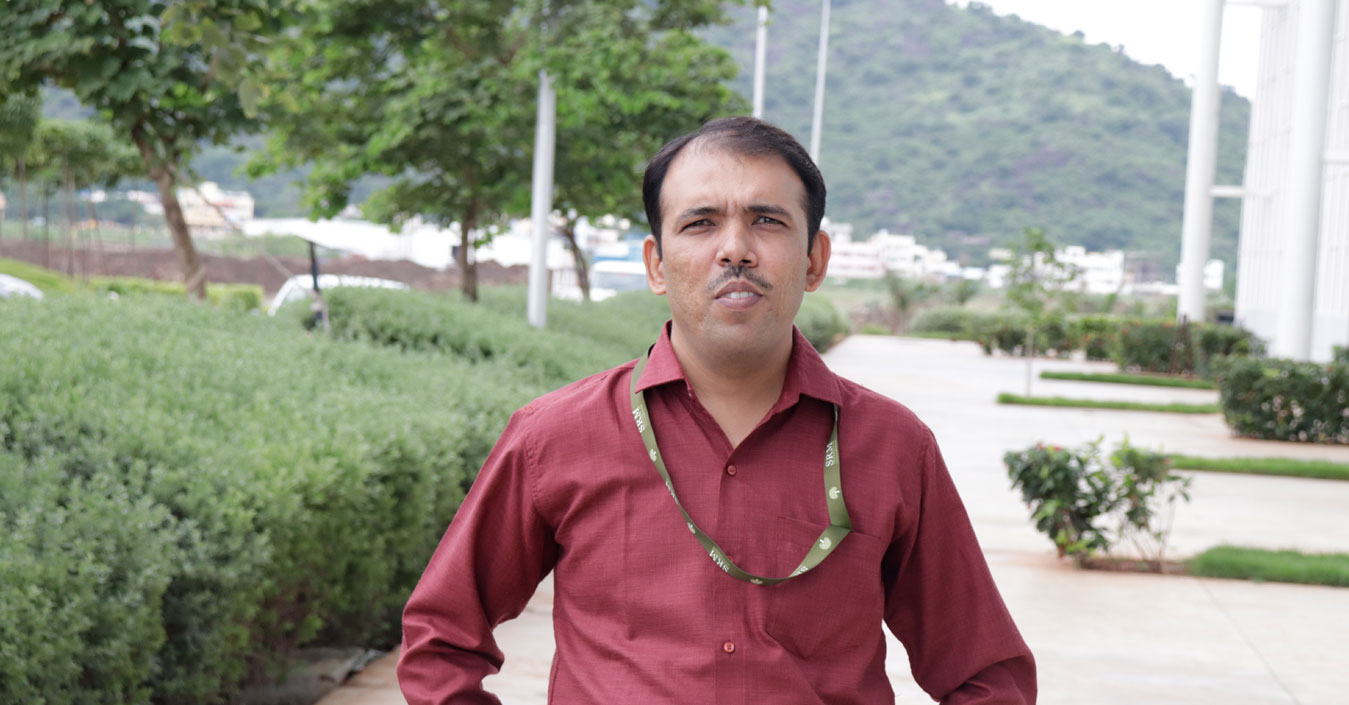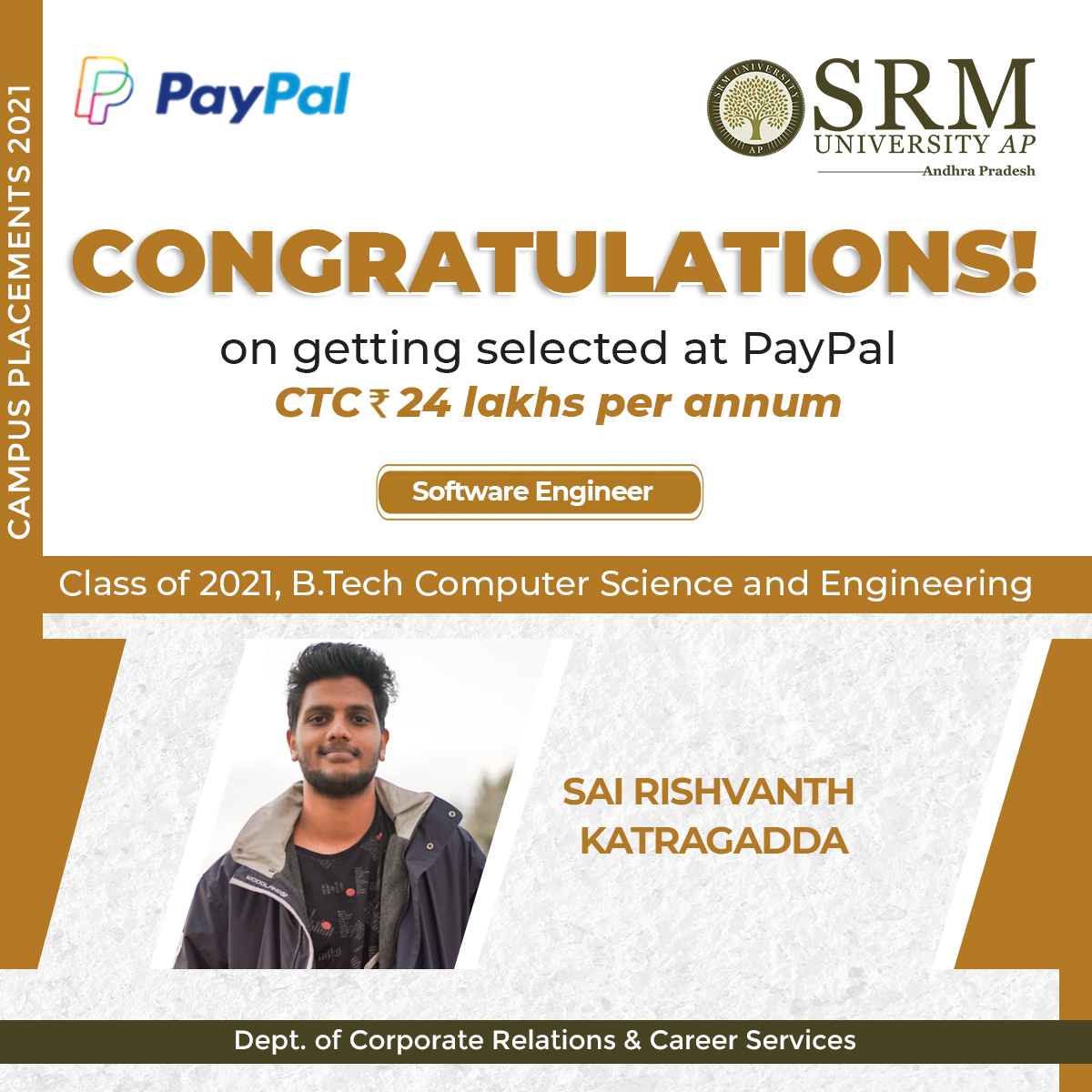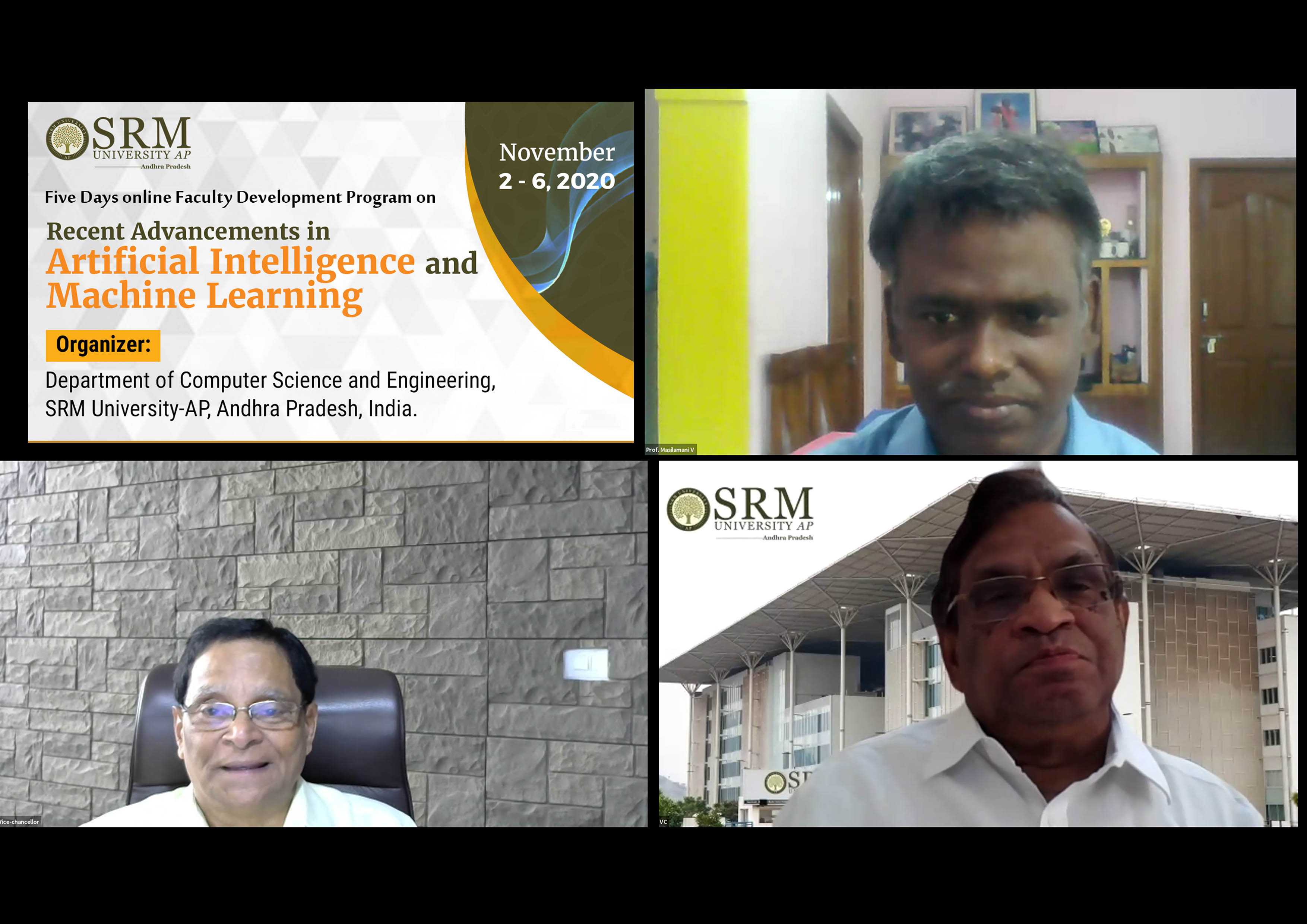DST, Government of India grants a total outlay of Rs.27 lakhs to Dr Imran Y Pancha
Utilizing photosynthetic microalgae to produce renewable biofuel
 Dr Imran Y Pancha, Assistant Professor, Department of Biological Sciences, SRM University-AP, Andhra Pradesh has received an outstanding total outlay of Rs.27 lakhs from the DST, Government of India, to work on “Chemical modulator based microalgal biorefinery for the production of biofuels and bioproducts”. Dr Imran was fascinated by the potential of microalgae to reduce greenhouse gases (GHGs) as well as its ability to accumulate a high amount of energy reserved molecules such as lipids/starch in the cells. Through his research, Dr Imran will be understanding the mechanism behind this and also, exploit microalgae for biofuel production.
Dr Imran Y Pancha, Assistant Professor, Department of Biological Sciences, SRM University-AP, Andhra Pradesh has received an outstanding total outlay of Rs.27 lakhs from the DST, Government of India, to work on “Chemical modulator based microalgal biorefinery for the production of biofuels and bioproducts”. Dr Imran was fascinated by the potential of microalgae to reduce greenhouse gases (GHGs) as well as its ability to accumulate a high amount of energy reserved molecules such as lipids/starch in the cells. Through his research, Dr Imran will be understanding the mechanism behind this and also, exploit microalgae for biofuel production.
Due to the development of industrialization and modernization, global energy demand is continuously increasing. Given that the fossil fuel energy reserve is limited, and its utilization causes various serious environmental issues such as global warming and the accumulation of GHGs in the atmosphere, renewable energy obtained from various biomass is a potential alternative to reduce atmospheric GHGs and the dependency on fossil-based fuel. Microalgae is one of the promising resources among various biomass since it has a high growth rate and photosynthetic ability in comparison to other terrestrial crop plants. Microalgae also accumulate a high amount of lipids and carbohydrates in the cell. Moreover, these microalgae can be cultivated in wastewater or seawater, which avoids the food versus fuel debate.
Dr Imran explains, “Microalgae usually accumulate lipid under stress conditions such as nitrogen starvation, which results in lower biomass production, limiting the commercialization of algal biofuel. The present research’s primary objective is to uncouple growth and lipid production pathway in the microalgae using chemical modulators. Utilization of such chemicals is also effortless in large scale production compared to the standard starvation approach. The next aim is to develop a process to extract multiple products such as pigments, lipids, and carbohydrates from single microalgal biomass. The development of such a biorefinery approach will lower the overall cost of the process and make it more economical on a large scale. To conclude, the focus of the project will be on utilizing photosynthetic microalgae to produce renewable biofuel and other commercially important products in a biorefinery manner. Utilization of microalgae will not only help to produce green fuel but also help in reducing atmospheric carbon dioxide (CO2) which creates several environmental issues.”
Using the SERB-SRG grant, microalgal cultivation facility will be established at SRM university-AP. The long-term goal of Dr Imran’s research group is to understand the molecular mechanism behind the accumulation of energy reserved molecules in the microalgae. Understanding such mechanisms will help to develop sustainable technology for the production of renewable biofuels from microalgae.
- Published in News, Research News
PayPal recruits Sai Rishvanth Katragadda
 Sai Rishvanth Katragadda, Final year, Department of Computer Science and Engineering, SRM University-AP, Andhra Pradesh shone in the recruitment drive conducted for the first outgoing batch of the university. Sai Rishvanth got selected by the recruiters of PayPal who offered the brilliant student a package of 24 LPA for the position of Software Engineer. PayPal is a reputed company that provides a worldwide online payment system, online money transfers, and serves as an electronic alternative to traditional paper methods.
Sai Rishvanth Katragadda, Final year, Department of Computer Science and Engineering, SRM University-AP, Andhra Pradesh shone in the recruitment drive conducted for the first outgoing batch of the university. Sai Rishvanth got selected by the recruiters of PayPal who offered the brilliant student a package of 24 LPA for the position of Software Engineer. PayPal is a reputed company that provides a worldwide online payment system, online money transfers, and serves as an electronic alternative to traditional paper methods.
Sai Rishvanth has consistently exhibited his mettle in academics and has been scoring excellently in all the examinations conducted by SRM AP. He was also selected by the university to visit the University of California, Berkeley for the Semester Abroad Programme. In addition, he grabbed the opportunities presented by SRM AP and worked on projects where he developed applications to provide solutions in the domain of travel, predictive data analysis, crowdfunding, crypto-token, and environment.
Guided by the faculty, and founders of the student-run Next Tech Lab at SRM AP, Sai Rishvanth participated in innumerable national and international hackathons to win several accolades and awards. Further, the student at an immensely young age received the opportunity to present papers in international conferences and publish his paper in the esteemed journal Springer Journal for Engineering and Sciences.
For detailed campus placement information, visit: Please Click Here
- Published in CR&CS NEWS, News
Prof N Balakrishnan at the University Distinguished Lecture Series 02 organized by SRM University-AP, Andhra Pradesh
Enthralling talk on “Data to Discovery in Information Security”
 Prof N Balakrishnan, Honorary Professor, Super Computer Education and Research Centre, Indian Institute of Science (IISc.), Bengaluru, delivered an enthralling talk on “Data to Discovery in Information Security” under the auspices of University Distinguished Lecture Series organized by SRM University – AP, Andhra Pradesh. Prof V S Rao, Vice-Chancellor, along with Prof D Narayana Rao, Pro Vice-Chancellor, and the conveners welcomed him. Extending his warmest welcome, Prof V S Rao emphasized on the significance of Data and Information Security and the great interest and concerns it imposes in the recent times as well as the future. He says, “In the last two decades, data security concerns have increased exponentially along with emerging data reserves. Abundance of data without proper security with pose more threats than solutions.” On that note, he requested Prof N Balakrishnan to enlighten the audience on various issues pertaining to raw data security.
Prof N Balakrishnan, Honorary Professor, Super Computer Education and Research Centre, Indian Institute of Science (IISc.), Bengaluru, delivered an enthralling talk on “Data to Discovery in Information Security” under the auspices of University Distinguished Lecture Series organized by SRM University – AP, Andhra Pradesh. Prof V S Rao, Vice-Chancellor, along with Prof D Narayana Rao, Pro Vice-Chancellor, and the conveners welcomed him. Extending his warmest welcome, Prof V S Rao emphasized on the significance of Data and Information Security and the great interest and concerns it imposes in the recent times as well as the future. He says, “In the last two decades, data security concerns have increased exponentially along with emerging data reserves. Abundance of data without proper security with pose more threats than solutions.” On that note, he requested Prof N Balakrishnan to enlighten the audience on various issues pertaining to raw data security.
Prof T Ragunathan, Head of the Department of Computer Science introduced Prof N Balakrishnan to the participants. Prof N Balakrishnan lecture encompassed the explosion in data and the “Revenge of Silicon”, which made the emergence of Artificial Intelligence inevitable. He emphasized on the storage revolution which is reflected in the smaller systems comprising of more complex networks, as compared to the earlier version of computers which were used primarily for computing and processing. He enlightens, “Characterized by explosion in velocity, volume, and variety, the data generated by humans and machines coexist in the big data scenario. Earlier, we spoke of the convergence of Information and Communication Technology (ICT), and now we have moved ahead with Nano, Bio, Info, and Cogno (NBIC) convergence.”
Prof N Balakrishnan dedicated the second half of his lecture by explaining the “Revenge of Silicon”. He used the periodic table to explain that although Carbon and Silicon belong to the same 4th group in the periodic table, mankind preferred Silicon over Carbon. Further, the paradigm shifted with the advent of computers which were programmed to mimic humans. In addition, the communication revolution resulted in its enhanced capability along with numbers. Presently, 1.72 billion websites are operative, there are billions of mobile phone users, the Internet of Things (IoT) have been established, wireless networks, and other complex systems. Dr N says, “Technology has become an integral part of the society with emerging Cyber-physical systems, and social networks. In the near future, computers would begin behaving more and more like humans, which is referred to as the Revenge of Silicon. Further, NBIC will enable biological complex systems (human body parts) to be replaced by silicon engineered parts, heralding towards a new doctrine.”
Drawing examples from his research sprawled across four decades, Prof N Balakrishnan expressed concerns about the tremendous data being stored and used across networking platforms. He explains, “Data storage speed doubles every 9 months. All the information known to mankind since the beginning of civilization can be stored in a single computer. The social network of computers has its negatives in the form of terrorism which has recently entered the computer world. Security of such a world is an important issue.” Prof N Balakrishnan concluded his lecture by stating that mathematical predictive models can be used for a better understanding of the data attack detection. He established that Community Detection based BOTSPOT will provide a faster detection algorithm to estimate attacks thereby aiding concerns of data attacks.
- Published in News
Dr V Masilamani and Prof Dipti Prasad Mukherjee navigated the audience through engaging technical sessions
Initiation of Faculty Development Programme (FDP) on “Recent Advancements in Machine Learning and Artificial Intelligence” at SRM University-AP, Andhra Pradesh
 Faculty Development Programme (FDP) orchestrated by the Department of Computer Science Engineering, SRM University-AP, Andhra Pradesh was inaugurated by Prof VS Rao, Vice-Chancellor. The ten-day special programme is designed to provide insights on the latest developments in Artificial Intelligence (AI) and Machine Learning (ML) technology. Prof VS Rao said, “AI is the emerging branch of science which has its application in the fields of healthcare, entertainment, banking and finance, and marketing. The country’s progress would be accelerated due to the advent of AI that is so closely linked to human life.”
Faculty Development Programme (FDP) orchestrated by the Department of Computer Science Engineering, SRM University-AP, Andhra Pradesh was inaugurated by Prof VS Rao, Vice-Chancellor. The ten-day special programme is designed to provide insights on the latest developments in Artificial Intelligence (AI) and Machine Learning (ML) technology. Prof VS Rao said, “AI is the emerging branch of science which has its application in the fields of healthcare, entertainment, banking and finance, and marketing. The country’s progress would be accelerated due to the advent of AI that is so closely linked to human life.”
Similarly, Prof D Narayana Rao, Pro-Vice Chancellor spoke of the immense opportunities provided by the emerging AI technology. He said, “AI will be impacting human life in more ways than comprehendible. Considering its growth, demand for AI skills will continue to rise exponentially. As AI will continue to act as a technological innovator in the foreseeable future, there will be immense opportunities and prospects for the young professionals in this domain.”
The guest lecturer of the inaugural programme, Prof V Masilamani, Associate Professor, Computer Engineering, Indian Institute of Information Technology Design and Manufacturing (IIITDM) Kancheepuram, Tamil Nadu, India, discussed the importance of Machine Learning for digital image quality assessment. The other technical session was conducted by Prof Dipti Prasad Mukherjee, Professor, Indian Statistical Institute, Kolkata, who demonstrated how computer vision problems can be solved using machine learning techniques.
Further, the event was graced by the presence of Prof T Raghunathan, Professor, and Head of the Department of Computer Science and Engineering, along with other faculty members, and students as the audience. In addition, the technical sessions were coordinated by Dr Manikandan V M and Dr Sobin C C, Assistant Professors, Department of Computer Science and Engineering, SRM University-AP, Andhra Pradesh.
- Published in News

